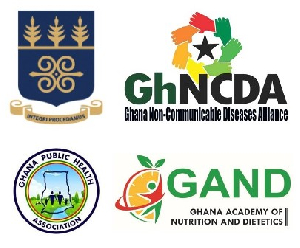A4HCoalition appeals to President Akufo-Addo to sign Excise Duty Amendment Bill
The Advocating for Health Coalition is applauding the Government of Ghana for heeding stakeholders’ calls and introducing excise taxes on harmful commodities, including sugar-sweetened beverages (SSBs).
The coalition expressed its appreciation to parliament for remaining faithful to public health interests and passing the Excise Duty Amendment Bill 2022 to save the lives of Ghanaians.
Addressing the media during a press conference, Mr. Labram Musah, the national coordinator of the Ghana NCD Alliance, indicated that no country can achieve the Sustainable Development Goals (SDGs), especially Goal 3 on health and well-being, if it does not prioritize the prevention and control of the harmful commodities implicated as risk factors for non-communicable diseases (NCDs).
Non-communicable diseases are projected to be Africa’s leading cause of death by 2030 if governments do not act urgently. Poor diets are responsible for some 11 million deaths annually, with cardiovascular disease, cancers and diabetes leading the causes.
Together, tobacco use, alcohol use, and unhealthy diets, including the consumption of SSBs, are among the leading risk factors of non-communicable diseases, a largely preventable cause of death that is responsible for 41 million annual deaths globally, with 94,400 of these deaths occurring in Ghana alone.
According to Mr. Labram Musah, the action, as recommended by the WHO Best Buys, includes tax measures, which have been globally proven as an effective NCD intervention, especially in low- and middle-income countries like Ghana, which are facing the double burden of diseases.
He indicated that many countries across the world have implemented taxes on SSBs and have seen positive health outcomes and revenue generation.
He further debunked some of the misconceptions about excise taxes. Excise taxes are often misconceived as being regressive, affecting vulnerable populations such as young people and poor people, he said. He explained that there is a lot of evidence to show that poor consumers are far more responsive to increases in price than people with higher incomes.
More especially because of the inelastic nature of health-harming products and their addictive nature, the imposition of taxes will not stop consumption entirely but will rather reduce consumption and increase revenue substantially.
“The industry should also know no one is calling for the banning of these products but for them to allow for some level of effective regulation to reduce the increase in NCDs and to ease the financial burden on the people in terms of health care costs, death, and disabilities,” the Coalition said.
The coalition therefore called on Ghanaians to join public health advocates and communities to accept and appreciate the health gains of the excise duty amendment bill.
Source: A4H Coalition




















































